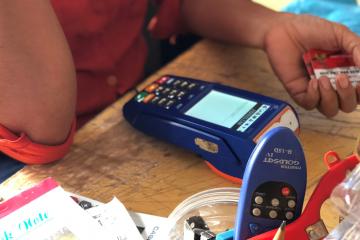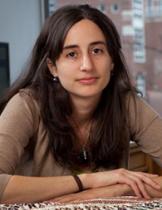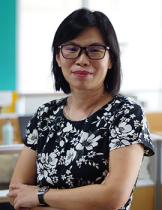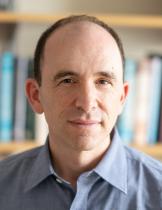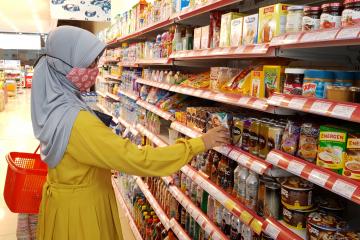
Nurturing the next generation of Indonesian development economists
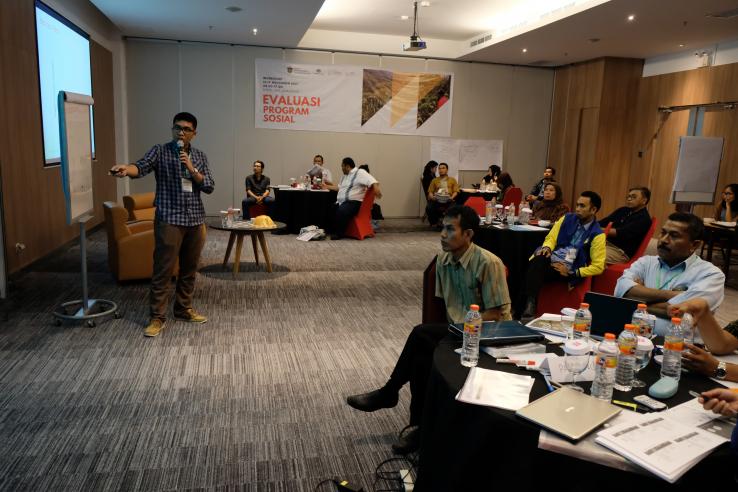
Indonesian policymakers and J-PAL affiliates have a rich history of partnering to design evidence-informed policies to improve the lives of millions. Underpinning recent successes, such as helping the government to reform Indonesia's largest food assistance program and better target the newly poor during Covid-19, is a passionate and growing community of Indonesian development researchers. Since the establishment of J-PAL Southeast Asia (SEA) in 2013, we have focused on building a cadre of local researchers and policy practitioners in development economics and strengthening the use of rigorous evidence in policymaking.
Increasing the pipeline
Increasing the pipeline of researchers and evidence-savvy policy practitioners is an important part of our mission. We recruit and hire young Indonesians who have research and policy aspirations—in fact, our team is 100 percent Indonesian and over 60 percent female. In addition to getting direct experience conducting rigorous research, our staff actively participate in training and receive mentorship from J-PAL affiliates, including guidance as they apply to graduate school.
As of June 2021, 43 Indonesian J-PAL SEA alumni have pursued higher education or roles in research organizations. To date, eleven former staff members are either pursuing or have completed a master’s program in economics or public policy, and ten are currently enrolled or have completed their PhD. Masyhur Hilmi, who is now a PhD student at Boston University, shared his experience working as a research manager and how it helped facilitate his career path:
The researchers, colleagues, and my supervisor were very supportive throughout my PhD application process. They were willing to share their experience doing a PhD study, help review my documents, and provide recommendations. My experience assisting affiliates while at J-PAL SEA greatly helps to guide my research work. I became familiar with Indonesian data, instrument design, and developing randomized evaluations. I carry the experience with me and upon graduation I aspire to continue doing research in the development sector. - Masyhur Hilmi
Many of our alumni also now work in government and development-focused NGOs, taking with them the principles of evidence-based policy in their new roles. Irwan Setyawan, for example, a former senior research associate at J-PAL SEA, went on to work at the National Council for Financial Inclusion of the Government of Indonesia (NCFI) and facilitated a partnership between our Inclusive Financial Innovation Initiative (IFII) and NCFI.
Patrya Pratama, co-founder and executive director of the education-focused NGO INSPIRASI Foundation, was formerly a senior research associate at J-PAL SEA. He remains an advocate for the use of randomized evaluations at INSPIRASI and among its partners and donors. When asked what advice he would give to young professionals in the development sector, he shared the following:
I would say keep monitoring and evaluation at the top of your mind to continue learning and improving our program or policy for our beneficiaries. It is indeed easier said than done, but definitely worth it. - Patrya Pratama
Our commitment to support Indonesian scholars
To expand access to research opportunities, most J-PAL SEA randomized evaluations have Indonesian co-authors who are either based at an Indonesian institution or are Indonesian nationals based abroad. In addition to promoting knowledge transfer around research techniques, these partnerships lead to better research that is more engaged with the local context.
We have had 31 Indonesian co-researchers, with an additional six co-researchers applying for the Indonesian Research Fund. Some of our co-researchers have also launched independent randomized evaluations while continuing their research collaborations with J-PAL affiliates. Firman Witoelar, one of the first local researchers to join J-PAL SEA, is a fellow at the Australian National University and was previously a research director at SurveyMeter. He spoke on his six-year collaboration with J-PAL SEA:
Since there are many intricate details involved in a randomized evaluation project, working with J-PAL SEA has enabled me to focus on leading the research while the research team from J-PAL SEA manages the details in the field. Thanks to this support, I have been involved in three research projects and am developing three more projects with J-PAL SEA. - Firman Witoelar
We also provide early career economists with the opportunity to collaborate with the J-PAL team. Currently, we have five research and postdoctoral fellows, all of whom receive active mentorship and training from our staff and affiliates. Four out of five have now launched their own evaluations, while still maintaining collaborative work with J-PAL SEA. Gumilang Aryo Sahadewo, one of our postdoctoral fellows and assistant professor at the Gadjah Mada University, shared his insights on how J-PAL complements his aspiration as a researcher, and his journey in launching an RCT:
J-PAL has provided me with the opportunity to work in tandem with government partners and NGOs, enabling me to understand the actual challenges faced by communities—something I would not be able to gain from existing literature and reports. With the support from J-PAL and the group of young researchers working at the SEA office, we have been successful in launching a randomized evaluation on improving the education landscape of Indonesia, and two other randomized evaluations are currently in the planning stage. - Gumilang Aryo Sahadewo
We also seek to address regional disparities in academic capacity in Indonesia. Our team has, for example, conducted training for academics and students from outside Java, namely in Universitas Syiah Kuala in the far west of Indonesia and Universitas Hasanuddin in Eastern Indonesia, where academic capacity is less developed.
We look forward to continuing our work to provide a collaborative and supportive academic environment for Indonesian scholars interested in development economics and to help contribute to the pipeline. We are currently recruiting new research staff members and postdoctoral fellows to join us in this work.
Related Content
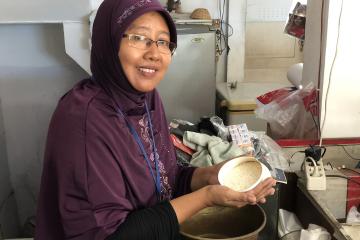
The Impacts of In-kind Food Transfers versus Electronic Vouchers on Poverty Reduction in Indonesia

Community-based targeting to combat Covid-19-induced poverty
